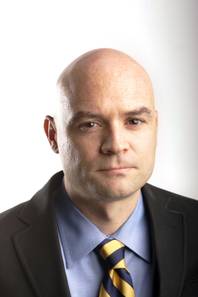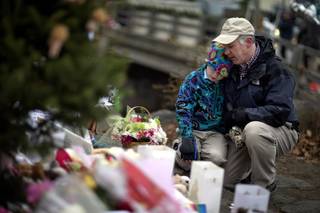Friday, Dec. 21, 2012 | 6:40 p.m.

J. Patrick Coolican
Sun archives
When I heard about the massacre in Newtown, my first thought was about those families because that pain will never go away.
My second thought was about my father. He’s been on the school board for the better part of a quarter century in my hometown of East Hampton, Conn., which is 50 miles northeast of Newtown, and he did a stint on the state school board, as well.
My father and I don’t agree on much. Earlier this year, he sent me a subscription to National Review, the conservative journal. He has a mischievous sense of humor, and I suspect that in addition to thinking I’d be miraculously converted to the true faith, he liked the idea that I’d be on all the conservative mailing lists and get solicited for money from the likes of the George W. Bush Presidential Library and Museum.
One thing we do agree on, however, is that America’s obsession with security is destructive to our way of life. He proudly refuses to lock doors and even leaves his keys in his car when at the local market. (OK, that one’s a little baffling.)
His attitude is: if I’m gonna live in this little hamlet in the middle of nowhere, what good is it if I have to lock my doors?
So I figured his reaction to Newtown would be dismay at the inevitable freak-out and calls to turn our schools into heavily fortified camps that resemble prisons more than learning environments.
Of course I was right. “For every bit of security we gain, we lose a little bit of freedom,” he told me.
The local high school in my hometown has installed a security system that locks the doors once school starts; office staff buzz in visitors after seeing them on a video monitor.
“I find that to be an affront. I can’t walk into East Hampton High School?” he asked, incredulously.
Now, after a weeklong silence, the National Rifle Association’s executive vice president, Wayne LaPierre, has called for armed guards in our schools, with the federal government spending whatever is necessary to get it done — by January.
Let’s leave aside the toxic messenger and the entire topic of gun control for another day and just talk about armed guards in our schools.
As Dave Weigel of Slate pointed out: “This isn't an entirely new idea. You probably don't remember the name of Neil Gardner, a sheriff's deputy in Jefferson County, Colo. He was the armed guard assigned to watch Columbine High School who usually ate lunch with the students, so he could be in the school.”
It’s not clear a shootout at any of these massacres would have saved lives.
My father was blunt in his dismissal of the idea: “That’s ridiculous.”
Part of the argument is economic. “If you wanna hire an armed guard, that’s one fewer teacher,” he said.
There are about 100,000 public schools in America. Let’s do the math: If you spend $50,000 per school on an armed guard — and that’s a conservative estimate — that’s $5 billion. Some schools already have police, so the number might be somewhat lower, but you know this will turn into a typical boondoggle of training and equipment costs.
The choice is clear: Raise taxes — and who thinks the NRA membership favors that? — or eliminate an educator position in exchange for your armed guard.
It always irritates me when I’m at the mall or a bookstore and I see an armed security officer — the price of the goods and services I buy is higher so we can pay for all this security.
My colleague Paul Takahashi informs me that the Clark County School District spends $1.78 million, or about 0.8 percent of the district’s $2 billion general fund budget, on salaries and benefits of its police force. The high schools have their own officers; middle and elementary schools do not. Let’s keep it that way.
Amanda Fulkerson, district spokeswoman, said in an email the administration has tried to maintain a sense of normalcy, sending a memo to principals instructing them not to cancel events or do anything out of the ordinary. “The message we've been pushing is — turn off the TV, talk to your kids, send them to school. Do not put unnecessary fear of school into your kids.”
As my father noted to me, “School is the safest place for a kid.”
The data show he’s right. According to the Bureau of Justice Statistics, during the 2008-09 school year, there were 1,579 homicides in the United States among school-age youth ages 5–18, of which 17 occurred at school. That’s 1 percent.
Now throw in all the automobile deaths. In 2009, 1,314 children 14 years and younger died in crashes, and approximately 179,000 were injured. About 2,700 teenaged drivers were killed in 2010.
(It’s worth noting that America is the safest it’s been in decades, with violent crime rates collapsing for the better part of two decades. Moreover, violent crime is almost always between two people who know each other or are gang rivals. There’s a lot more to be done about crime, especially in some hard-hit urban areas, where Glock-wielding gang members fight on. But we hear precious little about that.)
The locked-down school environment isn’t just expensive; it also sends the wrong message.
The Nevada News Bureau reported that Gov. Brian Sandoval has asked for a briefing on school security at the next meeting of the state Homeland Security Commission. He specifically requested information about “fencing and single points of entry and buzzing in and out.” (Newtown had a secure door-lock system that didn’t stop the killer.)
I don’t blame Sandoval for his concern, but our schools already look too much like prisons. How about a guard tower, concertina wire and sandbags? That will keep us safe.
I don’t mean to be flip. But all this security tells children that we live in a dangerous society, one that requires constant vigilance against random crime, a menace that can only be defeated with an endless arms race of more powerful weapons and body armor and "tactical" gear.
The self-defense fetishists may think so, but nothing could be further from the truth, which means it doesn’t belong in a school.


Join the Discussion:
Check this out for a full explanation of our conversion to the LiveFyre commenting system and instructions on how to sign up for an account.
Full comments policy